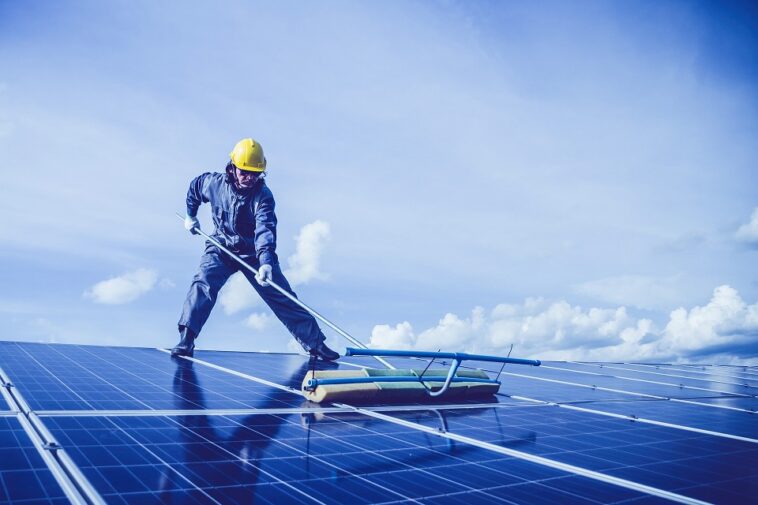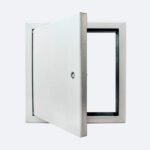Solar technology is one of the fastest-growing sources of energy. It’s renewable, clean, and relatively cheap. Still, many potential users are unsure if it’s the right choice for their home.
Solar energy has become a highly preferred renewable energy choice for residential and commercial establishments since it’s sustainable and helps cut electricity expenses. With innovative technology, solar energy systems have evolved to help lessen upfront costs and make this renewable energy available to more people. Nonetheless, many consumers worry about its expenses.
Here are some simple solutions to the questions, can I install solar panels on my house and how much is it going to cost me?
Can I Install Solar Panels On My House?
What is the main problem with the design of solar panels for a private house?
The main problem with the implementation of solar panel architectural design is the lack of preparation of all houses at the construction stage for the subsequent installation of solar panels. That is, today, every house must be built taking into account all the rules and regulations for the integration of the solar system onto its roof with further wiring of its parts to the necessary parts of the house.
Today there is a problem of “unattractiveness” of installing solar panels on the roof of private houses. Due to the lack of thought-out design of solar panels, the system often really looks disgusting, destroying the entire uniqueness of the building.
So that solar panels do not spoil the design of a private house, everything should be built according to the rules of solar architecture.
What is solar architecture?
Solar architecture is a set of measures that are necessary for the implementation of a private house focused on the installation of solar systems. This is one of the few options to get the perfect design of solar panels. As a result, the homeowner will receive the optimal solution – an aesthetic home and energy-efficient solar panels. The project is implemented according to the individual parameters of the site and local conditions. This is necessary to ensure the stable operation of solar panels.
Today, solar architecture is not standard because it requires additional investment in all details. In addition, for many homeowners, the perception remains that the solar system will make it difficult for them to sell their homes if they wish. It also seems to many that this will reduce the value of the house. But everything is exactly the opposite. People are more willing to buy houses in which everything is already thought out. There are solar panels, and the overall design looks organic. The main thing is that the solar system should not be in operation for more than 15 years because new future owners will be less willing to buy a house that will have to completely change the solar panels in the next ten years.
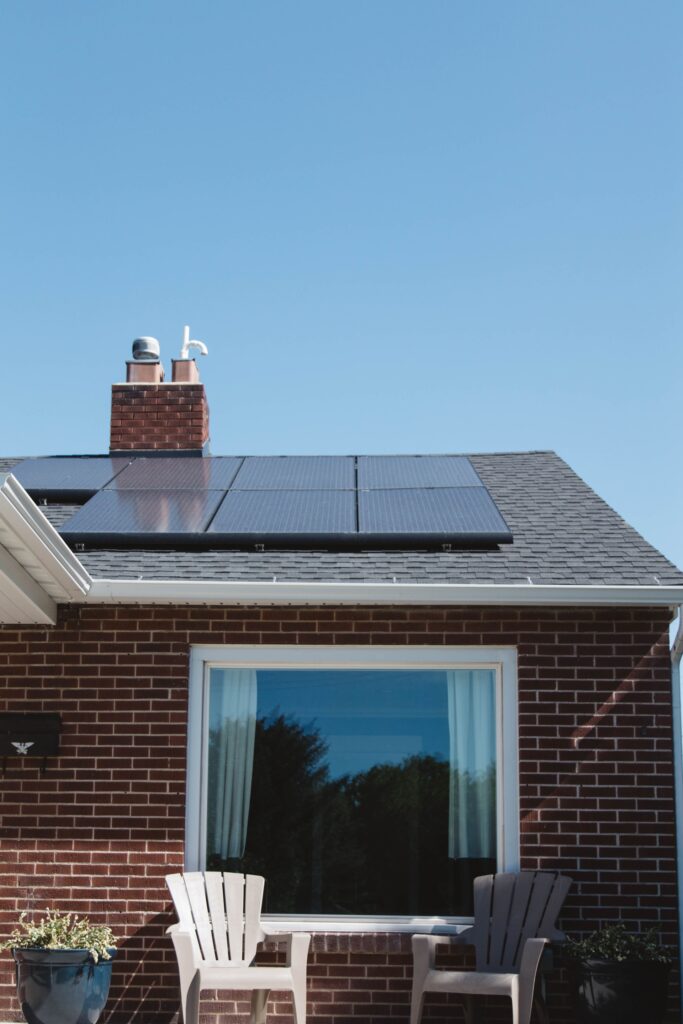
Assess Your Energy Needs
The average household power consumption determines the size and type of solar power system you should install. For example, large profile panels put out a lot of power and can serve as primary sources of electricity for a household. You can also add large-capacity solar batteries for a steady supply. However, this setup may be overkill if you are using solar to back up a few fixtures.
Investment in solar energy is a sound move if your consumption crosses a specific threshold. This may vary from state to state depending on the cost of electricity, but a monthly bill over $75 makes solar a good alternative. It’s also important to decide if you are going completely off-grid or using solar power as an adjunct to meet your energy requirements. The two setups are different. Therefore, an audit of household energy consumption is mandatory to decide if solar is a viable option for you.
The Local Climate
Your local weather has a lot of bearing on your solar power installation. The average solar hours dictate how long your system can generate power. A more efficient system will be a better investment if you have few solar hours or heavy cloud cover. On the other hand, clear skies and long days make the perfect climate for using standard solar power systems.
Furthermore, harsh climatic zones require highly resistant solar units. If your panels cannot survive extreme weather conditions, you are limited to specific climatic zones.
Check Your Roof
Most residential solar panels are fitted on the roof. Therefore, assessing the roof for strength and suitability for panel installation is vital. The ideal roof is south-facing, with little to no shading from trees or other buildings. Furthermore, the roof should be in good condition to bear the weight of the installation. If your roof requires any repairs or replacement, put the solar installation on hold until everything is in order.
Although the south-facing, open roof maximizes solar exposure and power generation, you can achieve the same exposure from ground installations. This is an excellent alternative if your roof is not at an ideal position.
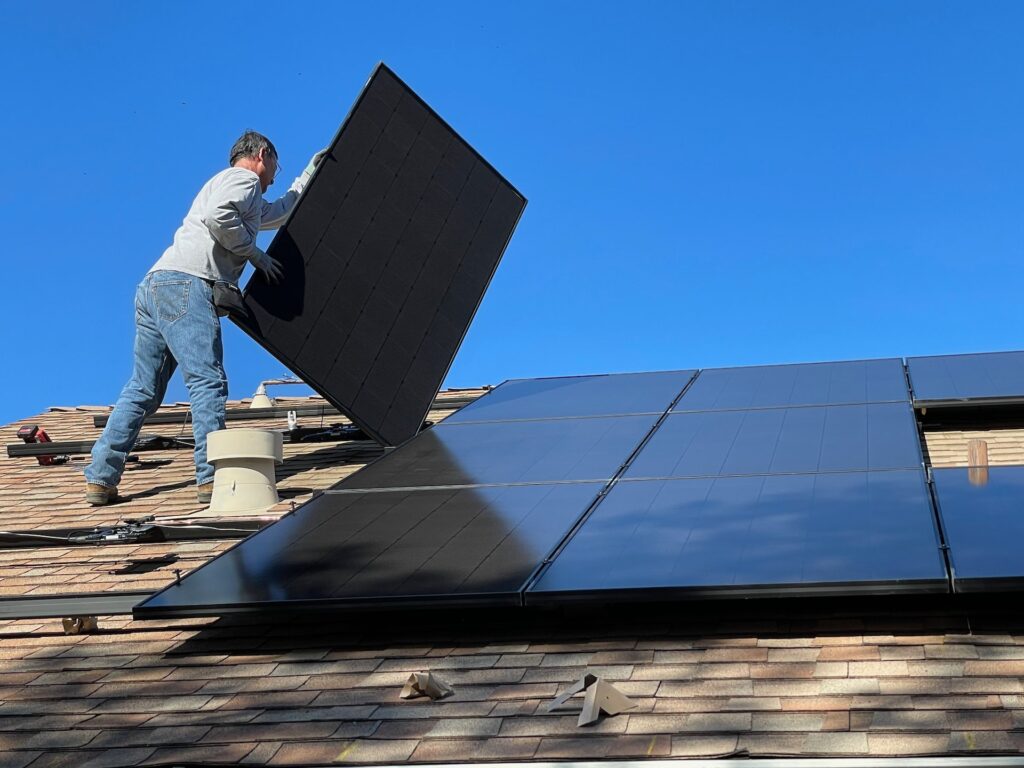
5 tips for creating solar panels architectural design
Here are some tips on how to implement the best roof design for solar panels:
- Consider the orientation and location of the house. They play a leading role in the processes for ensuring the efficiency of solar panels. Ideally, the panels should be installed on the south side of the roof, where there is as little shading from nearby trees or buildings as possible.
- Explore all types of solar panels and choose the right one. Several types of systems are available on the market. Each has its advantages and disadvantages. For example, monocrystalline panels are famous for their efficiency, polycrystalline panels are more affordable, and thin film panels are lighter and more flexible, which will be more favorable for non-standard surfaces.
- Incorporate solar panels into your design when planning your home. The best solution would be to implement solar panel architectural design before construction. They can even be installed as a roof or wall covering or integrated into a pergola or canopy.
- Trust everything to professionals. Even if it seems that there is nothing complicated in the implementation of the design of the solar panel project, believe me, there are too many nuances in it. Professionals surely know how to design an attractive and energy-efficient rooftop system because they have practical experience. Any mistake you make can cost a lot more than the services of a professional installer.
- Consider service requirements. Like any other part of the house, solar panels require maintenance. Without it, they may not serve the time allotted to them. Be sure to take into account all the features that are important for those who organize the maintenance of solar panels.
Assess the Costs and Benefits
Several things determine the cost of your solar panel system. Firstly, size and capacity drive up costs as high-power units are more expensive than small low-power panels. Furthermore, auxiliary fittings like solar batteries, inverters and capacitors drive up the overall cost. Purchasing particular brands is also more costly, and solar companies charge differently for their services.
Fortunately, all the costs of installing solar panels can be offset by how much you save on electrical bills. Furthermore, you can take advantage of the different financial incentives for solar power systems. These include tax credits, rebates, and cheap finance options. To learn more about the financial incentives for solar power systems and how they can help offset the installation costs, read more here.
How Much Does Building A Solar Energy System Cost?
Solar Batteries
A solar-only panel system transmits excess electricity to the grid. Consumers can earn credit for that excess electricity through a government-initiated program called ‘net metering.’
On the other hand, solar batteries enable you to store excess solar electricity rather than going to the grid. You can use the stored electricity when your solar panels can’t generate adequate electricity. Unlike a traditional utility or a solar-only energy system, a solar battery promotes an excellent backup source to power most appliances during a grid outage.
Solar batteries aren’t cheap. But for many consumers, the upfront costs of installing a solar battery pay off quickly by their savings on their energy bill. The current price range of solar batteries is between USD$8,500 to USD$10,000, excluding installation and additional equipment.
Property owners must consider their usage patterns and electricity rate to determine the suitable type of solar battery for them. Moreover, it’s crucial to choose a solar battery that’s compatible with the existing inverter. Check out this solar run battery review to learn more.
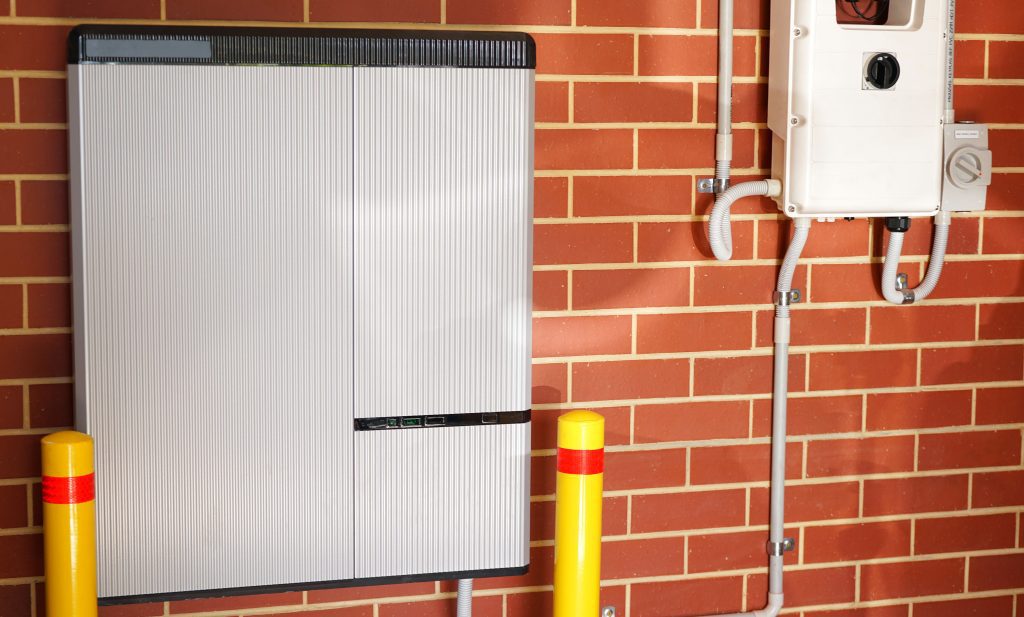
Solar Panels
Solar panels harvest the sun’s heat energy to convert and generate electricity. They’re also called photovoltaics. The lifespan of solar panels can reach over 25 years, and they’ve become more reliable with innovation.
The cost of solar panels is between USD$3,500 and USD$35,000. So, that’s about USD$16,000 on average. The cost differs depending on the solar panel’s type and model. Solar panel types include the following: monocrystalline modules, passivated emitter and rear cell (PERC), thin films, and polycrystalline panels.
PERC panels have a high solar energy collection, perfect for small spaces. They’re more expensive but more efficient to manufacture than traditional panels because of the additional materials necessary.
Monocrystalline panels are expensive because of the inefficient manufacturing process involving silicon crystals. On the other hand, polycrystalline panels are made from crystal fragments. They have a simple manufacturing process, making them more affordable than monocrystalline modules.
When it comes to the highest solar energy efficiency, monocrystalline solar cells are the winner. They’re made from one silicon, unlike polycrystalline solar cells made from several silicon sources. So, polycrystalline modules are slightly less efficient. Thin-film solar panels are cheap. But they’re less efficient than monocrystalline and polycrystalline solar panels.
Solar Inverters
A solar inverter is an essential piece of equipment when building solar energy systems for homes and businesses. This device regulates electrical power flow, turning direct current to alternating current electricity. Power grids utilize alternating current electricity to supply electricity to consumers.
Aside from regulating electricity flow, solar inverters play a crucial role in the entire system’s monitoring. They serve as a communication portal for computer networks to ensure all equipment and devices are doing good. Furthermore, solar battery storage systems depend on inverters to run without grid support when a power outage strikes.
A medium-sized solar inverter installation costs around USD$1000 to USD$1500. The price also depends on the type, such as central or string inverters, microinverters, and power optimizers plus inverter models.
String inverters are easy to install. On the other hand, microinverter installation and maintenance are more complex. However, they have higher energy production efficiency than string inverters. They also don’t need wiring because installers can directly connect them to the solar panels.
The lifespan of solar inverters is 10 to 15 years. Therefore, you need to replace your solar inverter at some point in your solar panel’s life. String or central inverters have standard warranties of five to 10 years.
Types of Solar Panel Inverters
Like people, inverters come in all sorts of shapes and sizes or in this case, types. Each types of solar inverters has its own strengths and weaknesses, so it’s crucial to choose the right one for your specific needs.
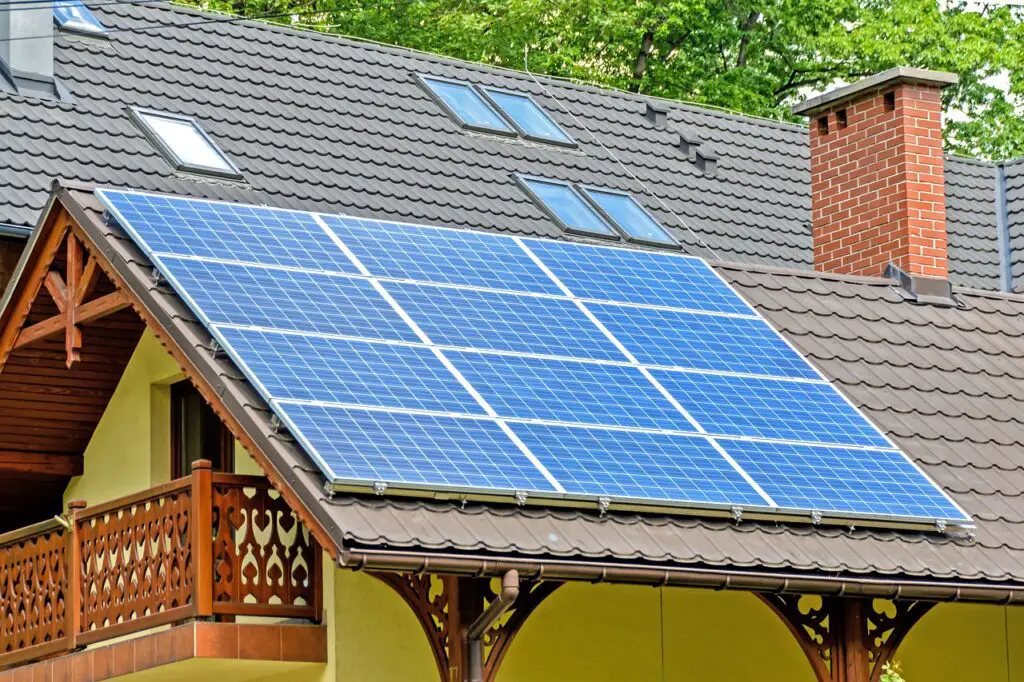
The 8 Different Types of Solar Panel Inverters
1. String Inverters
String inverters are like the old-school guys in the inverter world. They connect a “string” of solar panels and convert their combined DC output into AC power.
Pros and Cons of String Inverters
String inverters are relatively inexpensive and widely available, making them a good choice for many homeowners. However, they have a key weakness: if one panel underperforms, the entire string’s performance drops.
2. Micro inverters
Micro inverters are the “new kids on the block”. Instead of connecting a string of panels, each panel gets its own micro inverter.
Pros and Cons of Micro inverters
Micro inverters allow each panel to perform independently, which can result in higher overall system efficiency. However, they tend to be more expensive than their string inverter counterparts.
3. Central Inverters
Think of central inverters as the big brothers of string inverters. They’re commonly used in large-scale installations and can handle high power outputs.
Pros and Cons of Central Inverters
Central inverters can be a cost-effective solution for large-scale projects. However, like string inverters, they are sensitive to the weakest performing panel in the system.
4. Hybrid Inverters
Hybrid inverters are the “jack-of-all-trades”. They can handle inputs from both solar panels and battery storage systems.
Pros and Cons of Hybrid Inverters
Hybrid inverters offer great versatility, making them suitable for future expansion or integration with a battery storage system. However, their complexity often means a higher initial investment.
5. Battery Inverters
Battery inverters are specialists that convert DC power stored in a battery into AC power for use in the home.
Pros and Cons of Battery Inverters
Battery inverters allow for energy storage, which can provide power during outages or periods of low solar production. However, their use requires a significant upfront investment in a battery storage system.
6. Grid-Tie Inverters
Grid-tie inverters are team players. They connect your solar power system to the grid, allowing for the export of excess power.
Pros and Cons of Grid-Tie Inverters
Grid-tie inverters can provide potential income through net metering programs, but they shut off during power outages for safety reasons, leaving you without solar power when you might need it most.
7. Off-Grid Inverters
Off-grid inverters are the loners. They are designed to work independently of the grid, often in conjunction with a battery storage system.
Pros and Cons of Off-Grid Inverters
Off-grid inverters can provide power where grid connection isn’t possible or desired, but they require a more complex system setup and higher initial investment.
8. Power Optimizers (Module-Level Power Electronics)
Power optimizers are the problem solvers. They are installed at the panel level and “optimize” the output before it reaches the inverter.
Pros and Cons of Power Optimizers
Power optimizers can improve system performance and provide panel-level mo
Total Cost To Build A Solar Energy System
On average, the total cost to build a solar energy system is USD$15,000 to USD$25,000. This price includes a solar panel, solar battery, and inverter installation.
Contact A Reliable Solar Company
Solar companies offer various services, including installing, maintaining and repairing solar power systems. Furthermore, solar companies advise on the best installation for your home, conducting professional assessments and offering recommendations on your solar needs. Nonetheless, finding a good company is challenging. You must thoroughly research the top companies in the business and look up client reviews to narrow your search. Ask for referrals to bolster your research.
A good solar company will provide reliable estimates on installation and solar maintenance, and offer reliable results on services and products. A good company also offers support throughout the operational life of your solar system. As a result, you always walk the journey with professionals.
Ultimately, every home can benefit from solar panel installation. However, it’s imperative to determine which setup matches your needs and circumstance.


